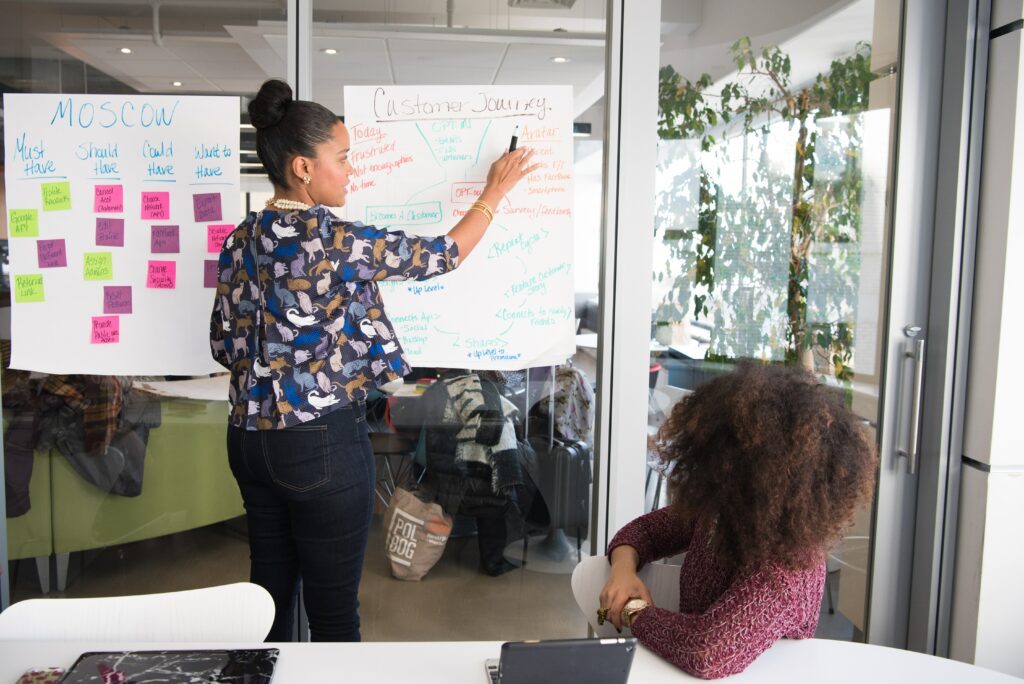Key competencies for 2024: develop your team's soft skills
In an ever-changing world of work, companies need to adapt and develop new skills to stay competitive. Among these skills, soft skills play an increasingly important role.
These skills, such as communication, collaboration, problem-solving and time management, are essential for individual and collective success. They enable employees to work effectively together, adapt to change and face up to challenges.
Don’t overlook the importance of soft skills in business
Neglecting to develop soft skills within a team can have major consequences:
- Poor communication and collaboration: This can lead to conflicts, delays and lower productivity.
- Difficulty adapting to change: Employees may find it difficult to learn new things and keep pace with technological change.
- Lack of employee commitment: Employees who don’t feel valued or appreciated may be less motivated and less productive.
The benefits of developing soft skills?
On the other hand, investing in the development of soft skills can bring many positive benefits.
Here are some of the benefits of developing soft skills within a team:
- Improved communication and collaboration: Employees with good communication skills are able to express their ideas clearly, listen well to others and resolve conflicts constructively. This improves team collaboration and creates a more positive working environment.
- Increased productivity: When employees are able to work effectively together, they are more productive. Soft skills also enable employees to manage their time better and focus on important tasks.
- Better adaptation to change: The world of work is constantly evolving, and companies need to adapt quickly to new technologies and markets. Employees with good soft skills are better able to adapt to change and learn new things.
- Enhanced employee commitment: Employees who feel valued and appreciated are more committed to their work. Soft skills enable managers to create a positive and motivating work environment for their teams.
How do you develop soft skills?
Soft skills are therefore an essential investment for companies wishing to succeed in an ever-changing world of work.
There are many ways to develop soft skills within a team. Here are a few tips:
- Identify your team’s needs: The first step is to identify the soft skills your team needs most. You can do this through individual assessments or group discussions.
- Set up training courses: There are many training courses available for developing soft skills. You can choose general or more specific training courses, depending on your team’s needs.
- Encourage mentoring and coaching: Mentoring and coaching can be effective ways of developing soft skills. Mentoring enables employees to learn from a more experienced colleague, while coaching enables employees to work on specific objectives.
- Encourage experiential learning: Experiential learning is an excellent way of developing soft skills. Encourage your employees to take on new projects and responsibilities.
- Create a culture of continuous learning: It’s important to create a culture of continuous learning within your company. This means encouraging employees to continuously train and develop new skills.
quarksUp: a modular offering to support the development of soft skills
A comprehensive tool for developing and managing corporate training
quarksUp Formation offers a centralized platform for creating and distributing your catalog of training courses dedicated to employee development. Identify your employees’ specific needs and set up personalized programs. Real-time monitoring of actions carried out enables us to assess training effectiveness and optimize investments.
Individual interviews for a precise assessment of needs
quarksUp Careers offers you a module dedicated to career management and talent development. This module enables you to conduct individual interviews with your employees to identify their training and soft skills development needs. These interviews enable us to draw up personalized development plans and monitor each employee’s progress.
Agile, accessible training through e-Learning
quarksUp e-Learning offers a flexible e-learning solution accessible to all employees. Employees can train at their own pace and in complete autonomy. This agile approach enables companies to rapidly disseminate the new skills they need and encourage the development of soft skills.
By combining these three powerful modules, quarksUp offers companies a complete solution for developing their employees’ soft skills, and thus improving their individual and collective performance.
A number of signals may alert you to the need to develop soft skills within your teams:
- Communication and collaboration difficulties: frequent conflicts, lack of cohesion, project delays, etc.
- Poor adaptation to change: resistance to new technologies, difficulty in adopting new working methods.
- Lack of employee commitment: demotivation, absenteeism, high turnover, etc.
- Individual assessments and coaching interviews: feedback from employees and managers can reveal gaps in soft skills.
Fortunately, there are many ways to develop your employees’ soft skills!
- Set up training courses: a wide range of training courses are available to develop soft skills such as communication, collaboration, problem-solving and time management.
- Encourage mentoring and coaching: an experienced mentor can help your employees progress, while coaching enables employees to work on specific objectives.
- Encourage learning through experience: encourage your employees to participate in new projects and take on new responsibilities.
- Create a culture of continuous learning: encourage your employees to continually learn and develop new skills.
- Use digital tools: platforms like quarksUp offer comprehensive solutions for developing your employees’ soft skills, with training modules, assessment tools and progress tracking features.
Yes, there are many training courses to help your teams develop their soft skills.
- Communication: learn to communicate effectively, listen actively and resolve conflicts.
- Collaboration: develop team spirit, cohesion and the ability to work together towards a common goal.
- Problem solving: learn to identify problems, analyze causes and find creative solutions.
- Time management: learn how to organize your work, prioritize tasks and manage stress.
- Leadership: develop your leadership, motivation and delegation skills.
- Management: learn how to manage a team effectively, delegate tasks and give feedback.
For the development of soft skills to be successful, it is important to involve and motivate employees.
Here are a few tips:
- Clearly communicate the objectives and benefits of developing soft skills: employees need to understand why it’s important to develop their soft skills, and what benefits it will bring them.
- Offer a variety of training courses and activities: there are many ways to develop soft skills, so it’s important to offer a variety of training courses and activities to meet the needs of all employees.
- Encourage experiential learning: let employees put their new skills into practice in real-life situations.
- Recognize and reward employee progress: congratulate employees on their efforts and progress.
It’s important to measure the impact of training on the development of your employees’ soft skills.
- Set up pre- and post-training assessments: this will enable us to measure the progress made by our employees.
- Gather feedback from participants: employees can share their impressions of the training and its impact on their skills.
- Observe changes in behavior: soft skills training should result in concrete changes in employee behavior, such as better communication, more effective collaboration or more optimal time management.
- Track performance indicators: the impact of training can also be measured by tracking performance indicators, such as productivity, customer satisfaction or staff turnover.
Yes, developing soft skills is an ongoing process. The world of work is constantly changing, and it’s important that employees continue to develop their skills throughout their careers.
Companies also need to create a culture of continuous learning that encourages employees to train and develop on an ongoing basis.
You may also be interested in 😊

GPEC: Definition and implementation tools
What is GPEC (Gestion Prévisionnelle des Emplois et des Compétences) and how can it be implemented? quarksUp, expert in HRIS, answers your questions.

Annual appraisal interview: objective, grid
Annual appraisal interview: objective, grid
The annual appraisal interview is an opportunity to take stock of performance. quarksUp, expert in HRIS, guides you in preparing your objectives and evaluation grids.

